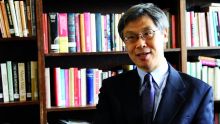The Lyrical in Epic Time: The Stories of Shen Congwen and Feng Zhi
David Der-wei Wang - Edward C. Henderson Professor of Chinese Literature, Harvard University & Director of CCK Foundation Inter-University Center for Sinological Studies
The Council is pleased to present the 55th Edward H. Hume Memorial Lecture.
This talk will introduce the lyrical in epic time as an exemplary case of modern Chinese literary thought. While the lyrical may seem like an unusual form for representing China’s social and political crises in the twentieth century, Wang contends that the trauma of national cataclysm and mass movement intensified Chinese lyricism in extraordinary ways. He describes the engagements undertaken by two intellectuals, Shen Congwen (1902-1988) and Feng Zhi (1905-1993), through the 1949 crisis, and ponders the consequences they brought about. Wang takes issue with the conventional wisdom that associates lyricism merely with sentimentalized subjectivity and rhapsodic artifice, arguing instead that lyrical provocations can serve as a critical index to the structure of feeling of modern China. As such, the lyrical in epic time constitutes a significant part of modern lyrical discourse which includes articulations from Heidegger to Benjamin, Adorno, Brooks and de Man.
David Der-wei Wang is Edward C. Hernderson Professor of Chinese and Comparative Literature at Harvard University. His works include The Monster That Is History: History, Violence, and Ficitonal Writing in Twentieth-Century China; Fin-de-siècle Splendor: Repressed Modernity in Late Qing Fiction, 1849-1911; Fictional Realism in Twentieth-Century China; and The Lyrical in Epic Time: Chinese Intellectuals and Artists Through the 1949 Crisis.
This annual lecture in honor of Dr. Edward H. Hume is made possible by the generosity of his family and many friends. Dr. Hume devoted much of his long and vigorous life to working in China and elsewhere in the cause of health care and medical training. He graduated from Yale College in 1897, and received his medical degree four years later from Johns Hopkins University. He worked in India from 1903 to 1905 before going to China, where he founded the Hsiang-ya Medical School and Hospital under the auspices of Yale-in-China in Changsha.
The lecture will be followed by a light reception. Please RSVP to eastasian.studies@yale.edu by 9/11/14 if you plan on attending.

